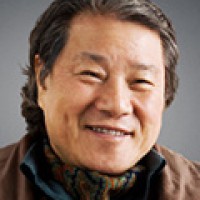Director, producer and screenwriter. He studied architecture at the Hongik University and entered the world of film under the mentorship of the director Shin Sang-ok, on whose production team he had worked. He made his directing debut with the film
Byeoldeului gohyang (The Stars Heavenly Home, 1974) that achieved great success and ratings. With
Geulae geulae oneuleun anyeong (Yes, Goodbye for Today, 1976) he started a series of films that dealt with the problems of the Korean society. This continued in
Balambuleo joheun nal (A Windy, But Pleasant Day, 1980),
Eodongui jashikdeul (People of Dark Streets, 1981),
Najeundero imhasoseo (Take Care of the Weak and Poor, 1982),
Babo seoneon (Declaration of Fools, 1983) and
Gwabu chum (Widow Dance, 1984). At that time, film studios were supervised by the government, and he became unpopular with the producers because of the criticism in his films. Forced to cooperate, he made
Muleupgwa muleupsai (Between the Knees, 1984) and
Er woo-dong (Er Woo Dong: The Entertainer, 1985) which achieved box office success, but lost the support of critics and his colleagues. In 1986 he founded his own production company PAN film and made
Lee Chang-houi wingudan (Lee Chang-ho's Baseball Team, 1986). Also very important in his filmography is the drama
Nageuneneun kileseodo swiji anhneunda (The Man with Three Coffins, 1987).

